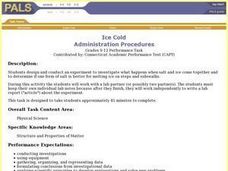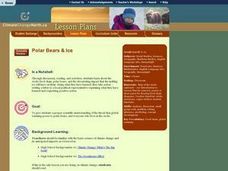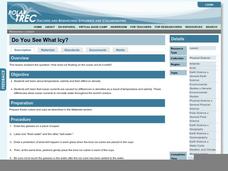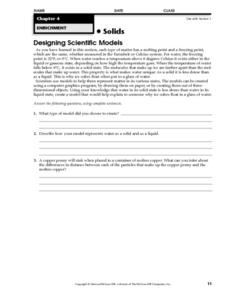National Wildlife Federation
Wherefore Art Thou, Albedo?
In the sixth lesson in a series of 21, scholars use NASA data to graph and interpret albedo seasonally and over the course of multiple years. This allows learners to compare albedo trends to changes in sea ice with connections to the...
Curated OER
Pressure Melting of Ice: While-U-Wait
Students demonstrates one of the few cases in which geologic solids visibly deform at room conditions. They suspend a weight on a thin wire over an ice cube to observe its effects over time.
Curated OER
Ice Energy
Students explore how chemicals change water. In this chemical change lesson, students participate in an experiment to observe how salt effects ice and how ice cream freezes.
Curated OER
Ice Energy
Students learn how science affects foods. In this chemical reactions lesson, students make two kinds of ice cream. They evaluate the different changes based on the ingredients.
Curated OER
Ice Eggs
Students melt colored ice cubes which are created from a funnel, balloons, water, and food coloring. In this ice lesson plan, students put food coloring into water in a balloon, freeze it, and see how the food coloring ended up making...
Curated OER
Ice Cold
Students design and conduct an experiment to investigate what happens when salt and ice come together and to determine if one form of salt is better for melting ice on steps and sidewalks.
Curated OER
The Big Melt
Pupils experiment with a variety of materials used for insulation by melting ice cubes.
Curated OER
Ice is N"ICE"!!
Students observe and describe, both orally and in writing. the different forms of water on the surface of the Earth and measure the approximate size of an iceberg. They also estimate and measure the amount of ice that floats above the...
Curated OER
Physical Properties of Ice
Students demonstrate that ice melts faster under pressure. They recognize that ice can be broken up or melted by pressure and then refreeze.
Curated OER
Observing Reactions
Young scholars use the scientific method to complete to experiments that have visible reactions. In this visible reaction lesson, students participate in an experiment with melting ice and one with inflating a balloon. Young scholars...
Curated OER
What's The Scoop?
Students explore the properties of matter. In this cross curriculum three states of matter science lesson, students listen to the poem "Eighteen Flavors" by Shel Silverstein, and predict what will happen if listed ingredients are...
Curated OER
Water and Ice
Students examine water. In this chemistry lesson, student examine the physical properties of water and how it changes from a liquid to a solid or a gas. This lesson contains links to a second and third complimentary lesson on...
Curated OER
March of the Polar Bears: Global Change, Sea Ice, and Wildlife Migration
Students study global change and how these changes impact wildlife. In this polar bears lesson plan students analyze maps and data to understand climate change.
Curated OER
Polar Bears and Ice
Students explore the Arctic food chain. They examine the needs of the polar bear and the threat that global warming poses to them. Students write a letter to a local political representative explaining what they have studied and...
Curated OER
Antarctica’s Melting and the Affect it has on the Ocean
Students calculate how much mass is lost and gained by Antarctica yearly. In this earth science lesson, students graph and analyze data from the given handout. They explain how this affects the world climate.
National Wildlife Federation
The Tide is High, but I’m Holding On… Using ICESat Data to Investigate Sea Level Rise
Based on the rate of melting observed from 2003-2007 in Greenland, it would take less than 10 minutes to fill the Dallas Cowboys' Stadium. The 17th lesson in a series of 21 has scholars use the ICESat data to understand the ice mass...
US Environmental Protection Agency
Sea Level: On the Rise
With the global temperature on the rise, the effects of climate change are starting to be seen. However, many people have a difficult time conceptualizing the long-term effects, such as sea levels rising. Given an easy and effective...
Curated OER
Water Cycle Stories
Students explore the water cycle and associated phase changes. They predict what happens to the mass of an ice cube in a Ziploc bag, discuss and act out phase changes and diagram the water cycle.
Curated OER
Freezing Point Depression
Students create ice cream in a zipped bag and measure the temperature of a salt/ice mixture. They discover how salt lowers the temperature necessary to freeze ice to a solid (below 0'C).
Space Awareness
The Big Meltdown
Explore the world (our world) of melting ice caps. Why are these caps melting? What is the effect of melting ice caps? Dive into the ever-present issue of global warming with a resource that has learners looking at data and participating...
Polar Trec
Do You See What Icy?
Here is a lesson that kicks off with a question. "How does ice floating on the ocean act as it melts?" As learners investigate this natural phenomenon, they'll discover that it has a lot to do with temperature, salinity, and the effect...
K12 Reader
What Glaciers Leave Behind
Glaciers may seem distant and stationary, but they are huge deposits of moving ice that have made changes to the earth's surface. Your pupils can learn about the different types of impressions left by glaciers by reading the short...
Curated OER
Thermochemistry
In this thermochemistry worksheet, students indicate whether the given processes are endothermic or exothermic reactions. Students complete the phase change diagram as well as define a given set of vocabulary words. Students calculate...
Curated OER
Designing Scientific Models
In this scientific models worksheet, students will use a model to represent matter in its various states. Students can use a computer graphics program, drawing on paper, or three-dimensional creation. Then students will complete 3 short...
Other popular searches
- Ice Cube Melting Experiment
- Melting Ice
- Melting Ice Cubes
- Ice Melting Kindergarten
- Ice Melting Investigation
- Ice Melting and Freezing
- Ice Melting Point
- Science Lessons Melting Ice
- Science Ice Melting
- Polar Ice Caps Melting
- Ice Melting Data
- Rate of Ice Melting























